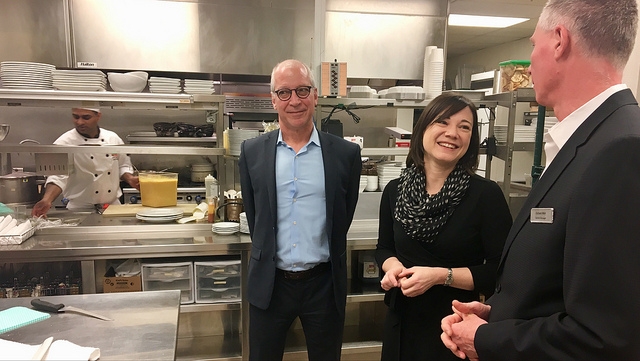
News
Energy Efficiency Alberta expands BNI program to help food services sector
March 8, 2018 — Energy Efficiency Alberta is expanding the Business, Non-Profit and Institutional (BNI) energy savings program, launched in May 2017.
March 8, 2018 By Ellen Cools
 Richard Main (right) shows Minister Phillips and Energy Efficiency Alberta vice-president Darryl Hill energy-efficiency retrofits made at the Residence Inn Airport Marriott and Courtyard in Calgary.
Richard Main (right) shows Minister Phillips and Energy Efficiency Alberta vice-president Darryl Hill energy-efficiency retrofits made at the Residence Inn Airport Marriott and Courtyard in Calgary. Organizations and businesses can now purchase and install eligible energy-efficient lighting, heating and other products to receive a rebate of up to $100,000 per year, increased from $60,000 originally.
The province is also adding new product rebates for the food services and hospitality industries, including energy-efficient ovens, fryers, dishwashers and more. Rebates for lighting, water-heating and HVAC products have also been expanded.
Rebate amounts have been increased for certain HVAC measures to better reflect the price of products in the Alberta market, says Energy Efficiency Alberta. Pre-approval application time frames have also been shortened from 12 to six months.
There are 88 hotel and motel projects and 40 restaurant projects underway that, once complete, will total over $320,000 in rebates and 32,000 GJ in energy savings.
“This expansion will help Alberta’s many excellent hotels and restaurants save both money and energy. By installing new energy-efficient products, businesses can lower their energy bills, reduce their emissions and reinvest in their operations. These rebates support a growing energy-efficient sector that creates jobs, diversifies the economy and helps businesses thrive,” said Shannon Phillips, Minister of Environment and Parks.
For example, the Residence Inn Airport by Marriott and Courtyard upgraded their lighting last year, saving 206 GJ of energy, which amounts to about $3,520 in energy cost savings per year. Over 1,200 organizations participated in the BNI program in 2017, with total rebates amounting to $3.5 million.
Print this page